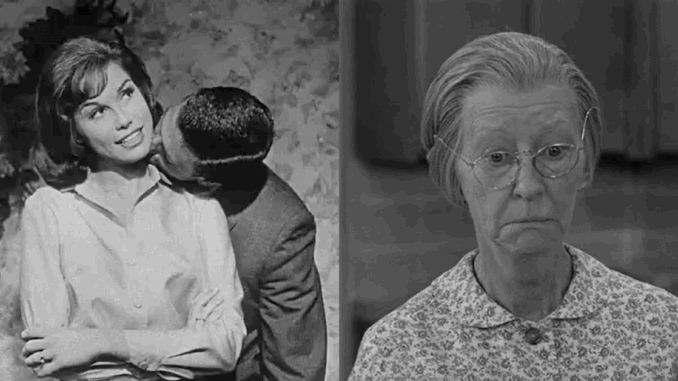
A Rare Moment of Honesty in Hollywood
Award shows have long been filled with scripted humility — that familiar blend of “I’m so surprised” and “I didn’t expect this” that so often feels rehearsed. In an industry built on performance, even gratitude can become an act. But in 1964, Mary Tyler Moore’s reaction to winning the Emmy Award for Outstanding Lead Actress in a Comedy Series wasn’t staged, and it wasn’t self-effacing for show. She truly believed she wouldn’t win.
At the time, Moore was starring as Laura Petrie on The Dick Van Dyke Show, the quick-witted, modern homemaker who matched her husband’s comic timing beat for beat. The role made her a household name — but Moore, ever modest, thought another sitcom legend had the award in the bag.
The Actress Who Bet Against Herself
In an interview with The Akron Beacon Journal before the ceremony, Moore made a bold prediction: she thought Irene Ryan, who played Granny Clampett on The Beverly Hillbillies, would win instead. “I’d bet on Irene Ryan,” she confessed, praising her fellow nominee for her fearless physical comedy and impeccable timing.
Ryan’s portrayal of Granny was one of television’s most recognizable performances. The Beverly Hillbillies had dominated the Nielsen ratings, becoming America’s top-rated program. To Moore, that seemed like a sure path to Emmy gold.
But when the envelope opened, it was Moore’s name that was called. Against her own expectations, she was now an Emmy winner — and the moment was refreshingly authentic. There were no carefully crafted tears, no false modesty. Just surprise, gratitude, and a genuine appreciation for the work behind her success.
Giving Credit Where It Was Due
Even in victory, Moore was quick to deflect praise. She didn’t see herself as a one-woman show, but as part of a perfectly tuned ensemble — and she credited the man behind the curtain: The Dick Van Dyke Show creator and writer Carl Reiner.
“Carl’s a genius,” Moore told reporters. “He comes up with a lot of unlikely comedy ideas, but he always makes them funny.” Her words weren’t the standard PR politeness. Reiner’s writing had indeed reshaped television comedy — offering domestic humor that was smart, sophisticated, and deeply human.
Moore trusted Reiner so implicitly that she joked, “If he were to have me get a divorce on the show and marry a member of the Ku Klux Klan, I’d say, ‘Great idea!’ because I know somehow he’d make it amusing.” Her comment, though delivered with a laugh, underscored the rare creative bond that defined the series.
A Star Who Redefined Television Femininity
Mary Tyler Moore’s portrayal of Laura Petrie wasn’t just funny — it was groundbreaking. In an era when sitcom wives were often written as either ditzy or docile, Moore gave her character depth, wit, and confidence. She wore capri pants on TV — a small rebellion that became a fashion statement — and matched Dick Van Dyke’s comic energy without ever fading into his shadow.
Her Emmy win in 1964 validated more than just her performance; it acknowledged a new kind of woman on television — smart, self-assured, and authentically modern. Moore wasn’t playing the typical TV housewife. She was something fresher: the everywoman viewers actually recognized.
Humility That Endured a Lifetime
Moore’s genuine modesty never left her. Even as she went on to greater success with The Mary Tyler Moore Show in the 1970s, she remained the same grounded, thoughtful performer who once bet on someone else to win. That authenticity became her trademark — both onscreen and off.
Looking back, her 1964 Emmy win feels like a perfect encapsulation of who Mary Tyler Moore was: talented, humble, and entirely real in a world that often rewards the opposite.
She may not have expected to win that night, but in doing so — and in how she handled it — she set a new standard for grace in Hollywood.